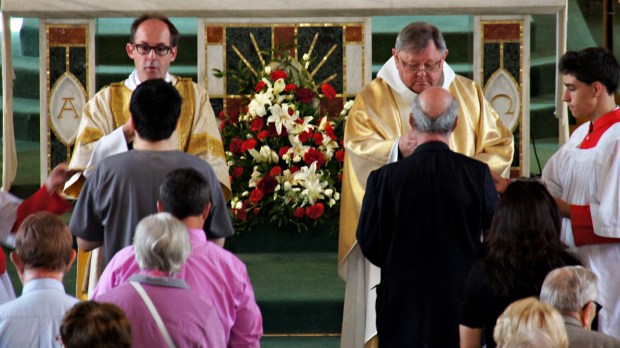Many non-Catholics attend Mass (often it is a wedding or funeral) and wonder if they can receive Holy Communion as well.
In some Protestant churches everyone is invited to communion, regardless of their faith or religious background.
However, in the Catholic Church, there are very specific rules as to who can receive Holy Communion.
Guidelines for Reception of Holy Communion
First of all, the Catechism of the Catholic Church explains that Eastern Orthodox Christians may receive Holy Communion in certain circumstances:
The Eastern churches that are not in full communion with the Catholic Church celebrate the Eucharist with great love. “These Churches, although separated from us, yet possess true sacraments, above all – by apostolic succession – the priesthood and the Eucharist, whereby they are still joined to us in closest intimacy.” A certain communion in sacris, and so in the Eucharist, “given suitable circumstances and the approval of Church authority, is not merely possible but is encouraged.”
CCC 1399
Reception of Holy Communion by Protestant Christians, on the other hand, is not possible in any circumstance:
Ecclesial communities derived from the Reformation and separated from the Catholic Church, “have not preserved the proper reality of the Eucharistic mystery in its fullness, especially because of the absence of the sacrament of Holy Orders.” It is for this reason that Eucharistic intercommunion with these communities is not possible for the Catholic Church. However these ecclesial communities, “when they commemorate the Lord’s death and resurrection in the Holy Supper . . . profess that it signifies life in communion with Christ and await his coming in glory.”
CCC 1400
It’s also important to note that some Catholics are not permitted to receive Holy Communion. This includes any Catholic who is conscious of grave, mortal sin and has not received the sacrament of confession.
All of us will fall into that category at some point in our lives, since we are not the Blessed Virgin Mary, preserved from all stain of sin.
The main takeaway is that Holy Communion is not something we can “grasp” at, but is a “gift” to be received by those who are prepared to receive it.



